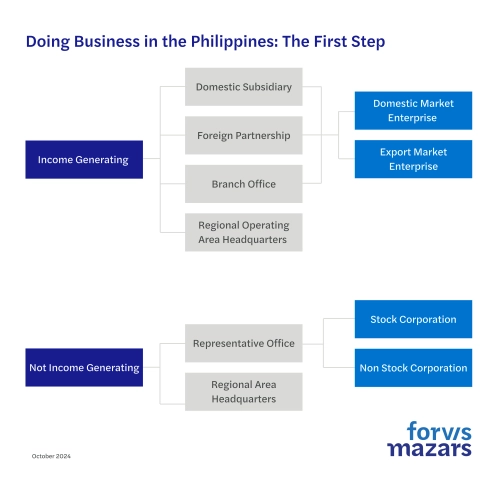List A:Foreign Ownership is Limited by Mandate of the Constitution and Specific Laws
| Foreign Equity Restriction | Industries/Activities |
| No Foreign Equity |
|
| Up to 25% Foreign Equity |
|
| Up to 30% Foreign Equity |
|
| Up to 40% Foreign Equity |
|
| Up to 60% Foreign Equity |
|
List B:Foreign Ownership is Limited for Reasons of Security, Defense, Risk to Health and Morals and Protection of Small Medium scale enterprises.
| Foreign Equity Restriction | Industries/Activities |
Up to 40% Foreign Equity
| Manufacture, repair, storage, or distribution requiring PNP clearance:
|
Manufacture, repair, storage, or distribution requiring DND clearance:
| |
|
Under the law’s latest amendment (or “Republic Act 11647” or “RA 11647”), micro and small domestic market enterprises with a paid-up capital requirement of $200,000 are still reserved for Philippine nationals unless otherwise set under RA 8762 or the "Retail Trade Liberalization Act" and other relevant laws. Furthermore, it clarified that the paid-up threshold was provided before the amendment, but only the term used is "small- and medium-sized domestic market enterprises.".
RA 11647 strives to further technological innovation and create a solid foundation when creating startups or startup enablers following the "Innovative Startup Act" (RA 11337) and lowering the capitalisation requirement to $100,000.
The previous rule of foreign nationals employing at least fifty (50) direct employees to become eligible for the $100,000 capitalisation requirement was enforced. RA 11647 states that enterprises now only need to have most of their direct employees to be Filipinos in order to become eligible for the lower capitalisation rule. However, this will only apply to the number of Filipino employees not less than fifteen (15). Domestic enterprises are mandated to implement an understudy or skills development program if they benefit from said lower capitalisation requirement to ensure the transfer of technology or skills to Filipinos.
Investment incentives
Foreign investors who wish to benefit from investment incentives may register with either the PEZA or the Board of Investments (BOI). The PEZA grants incentives to businesses engaged in exports that are located within identified economic zones. The BOI, on the other hand, administers the grant of incentives to businesses engaging any of the investment priority areas provided under the Investment Priorities Plan (IPP). Incentives that are also available for businesses that wish to operate in special economic and free port zones, such as those located in Subic and Clark, Pampanga.
Some of the incentives granted are exemptions from the payment of tariff and customs duties and other taxes and fees, Income Tax Holiday (ITH) and reduced tax rates.
Work permits and visas
To promote foreign involvement in the economic development of the country, the Philippine government has liberalised the visa requirements for certain types of foreigners. The visas that may be granted to foreigners who will work or provide services in the Philippines are as follows:
- Treaty Trader’s/Investor’s Visa under Section 9(d) of the Philippine Immigration Act
- Prearranged Employee’s Visa under Section 9(g) of the Philippine Immigration Act
- Special Non-immigrant Visa under Section 47(a) (2) of the Philippine Immigration Act
- Special Non-immigrant Visa under Executive Order (E.O.) No. 226
- Special Non-immigrant Visa under Presidential Decree (P.D.) No. 1034
- Special Investor Resident Visa (SIRV)
- Special Work Permit (SWP).
- Provisional Work Permit (PWP).
- Alien Employment Permit (AEP).
- Special Subic Work Visa.
Taxation
The main taxes imposed on corporations in the Philippines are:
- Corporate Income Tax
- Value-Added Tax (VAT)
- Withholding Tax (WT).
Other taxes include Percentage Tax (generally for activities not subject to VAT), Excise Tax, Documentary Stamp Tax, Local Business and Real Property Taxes.
Starting July 2020, Corporate Income Tax rate in general is 25% on net taxable income and 20% for corporations with next taxable income not exceeding Five Million AND total assets not exceeding One Hundred Million. In the 4th year of operations, the tax imposed is either 2% of gross income or 25% or 20% of net taxable income, whichever is higher. For entities covered by special laws (e.g. PEZA entities), a 5% income tax is imposed on the gross income. ROHQs, on the other hand, are entitled to an income tax rate of 10% on taxable income.
Starting January 2022 special tax rate is no longer applicable and the new effective rate is 25%. Quarterly income tax returns should be filed and the payment should be made, on or before the 60th day following the close of each of the quarters of the taxable year. The annual income tax return shall be filed and the payment made on or before 15th day of the 4th month following close of the taxpayer’s taxable year.
VAT at the rate of 12% is imposed on the sale, barter, exchange or lease of goods or properties and services in the Philippines, including the importation of goods. Being an indirect tax, the VAT can be passed on to the buyer or end user of the goods and/ or services.
On January 10, 2024, congress enacted RA 11976 or the Ease of Paying Taxes (EOPT) Act which amends the treatment of VAT on services which was shift from cash basis to accrual and now will be based on invoices and reported upon billing by the vendor or provider. The EOPT Act mandates single documents for both sales of goods and services. Hence, all references to Sales/Commercial Invoices or Official Receipts shall now be referred to as “INVOICE”.
The VAT returns must be filed and the corresponding payment (if any) made within 20 days following the end of each month (for monthly VAT returns, optional filing) and 25 days following the close of the taxable quarter (for quarterly VAT returns) unless the filer is enrolled under the Electronic Filing and Payment System (EFPS).
The withholding tax system is a means of collecting tax in advance. Withholding tax is a deduction on income payments (e.g. goods, services, rentals, interest, royalties, and dividends). EOPT Act amends the obiligation to deduct and withhold tax, which arises at the time income has become payable.
Tax rates range from 1% to 25%, depending on the nature of the payment. However, income payments to foreign entities may be subject to lower preferential tax treaty rates provided that a Certificate of Residence for Tax Treaty Relief Form has been accomplished before the payment of income is made. This form applies only to income payments for dividends, interests and royalties. Except for those enrolled under the EFPS, WT returns shall be filed and payment must be made on or before the 10th day of the month following the month of withholding (for monthly WT returns) and not later than the last day of the month following the close of the quarter during which withholding was made (for quarterly WT returns) .
Local business taxes, fees and charges are also levied by local government units (LGUs).
Audit and accounting
All legal entities are required to prepare annual financial statements in accordance to/ with the applicable financial reporting framework that is acceptable in the Philippines [i.e. either full compliance with the Philippine Financial Reporting Standards (PFRS) or PFRS for small and medium-sized enterprises (SMEs) or PFRS for Small Entities (SE), depending on the criteria prescribed by the SEC]. PFRS are broadly aligned with International Financial Reporting Standards (IFRS) while PFRS for SME and SE are fully aligned with IFRS for SMEs.
Threshold:
| PFRS for SMEs | Entity that has total assets of between P3,000,000 and P350,000,000 (US$70,000 to US$8,000,000) or total liabilities of between P3 million and P250 million (US$70,000 to US$5,500,000). |
| PFRS for SE | Entity that has total assets or total liabilities of over P3 million but not more than P100 million |
Entity may avail the exemption by adopting PFRS or PFRS for SMEs if it’s a subsidiary of a company that prepares financial statements in accordance with IFRS or PFRS or PFRS for SMEs.
The annual financial statements are required to be audited by the local independent external auditors before submitting to the Securities and Exchange Commission (SEC) and the Bureau of Internal Revenue (BIR). The performance audit is in accordance with the Philippine Standards on Auditing (PSA) and is also aligned with International Standards on Auditing (ISA).
Country Quirks
- Corporate applications with the SEC are a mix of electronic and manual filing.
- Company setup is fast, but closure takes an average of 2 years.
- In the 4th year of operations following the year of registration, corporate tax is either 2% of gross income or 25% of taxable income, whichever is higher.
- Withholding tax rates range from 1% to 25%, depending on the nature of the payment.
- Documentary stamp tax applies to documents, instruments, loan agreements, and related papers.
- Fringe benefit tax is 35% on the grossed-up value of fringe benefits, excluding rank-and-file employees.
- Net Operating Loss Carry-Over (NOLCO) allows losses to be carried over as deductions for the next 3 years following the year of such loss.
- Personal income tax rates range from 15% o 35% for annual income over PHP 250,000.
- Certain allowances which are minimal or which are classified as minimum benefits are tax-exempt.
- A 13th salary and bonuses of up to PHP 90,000 are non-taxable, while amounts over this are taxable.
- All employers and employees must contribute monthly to the government-mandated employee benefits (SSS, PhilHealth, and Pag-IBIG).
- Eligible female employees are entitled to 105 days of paid maternity leave, with an option for an additional 30 days of unpaid leave, if they have made at least 3 monthly contributions in the 12 months before childbirth, miscarriage, or emergency termination of pregnancy (ETP).








